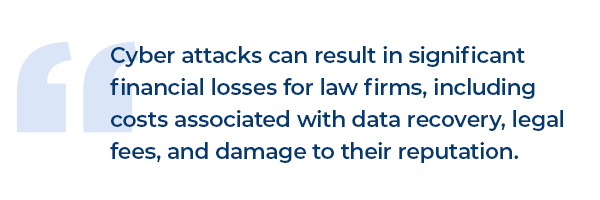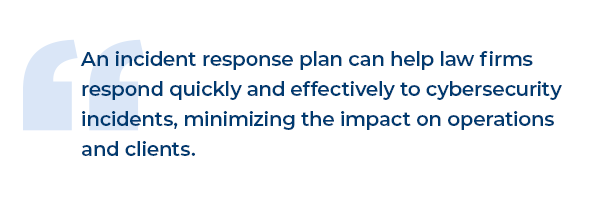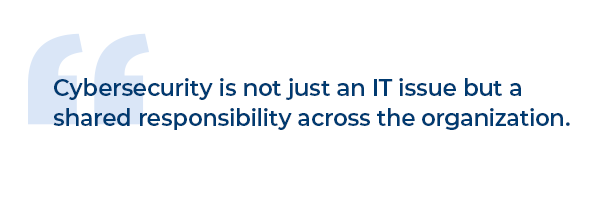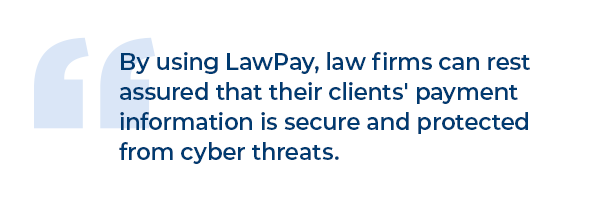Best Practices
Law Firm Cybersecurity: The Ultimate Guide

When people think of high-profile hacks, their minds don’t usually drift to the legal world. However, recent security breaches at several large firms have highlighted the vulnerabilities law firms face.
In fact, after one such event, Manhattan U.S. Attorney Preet Bharara said the incident “should serve as a wake-up call for law firms around the world: You are and will be targets of cyber hacking because you have information valuable to would-be criminals.”
Fortunately, you don't have to be a cybersecurity expert to secure your firm and protect sensitive data.
What is Law Firm Cybersecurity?
Law firm cybersecurity refers to the measures and practices put in place by a law firm to protect sensitive and confidential information from unauthorized access, theft, or damage.
Cybersecurity for law firms involves a range of practices, including:
- The use of secure networks and communication channels
- Data encryption
- Access controls
- Regular vulnerability assessments and penetration testing
- Employee training on security best practices
- Incident response planning
Why is Law Firm Cybersecurity Important?
Law firms house highly sensitive information that makes them attractive targets for cybercriminals. Therefore, law firm cybersecurity is essential for several reasons, including:
Protecting confidential information: confidential information, including client data, financial records, and confidential communications. Cybersecurity measures help ensure that this information is protected from unauthorized access or theft.
Maintaining client trust: Clients trust law firms to keep their confidential information safe. If a law firm experiences a data breach or other security incident, it can damage reputation and erode client trust.
Compliance with legal and regulatory requirements: Law firms are subject to a range of legal and regulatory requirements related to data protection, such as the General Data Protection Regulation (GDPR) in the European Union and the Health Insurance Portability and Accountability Act (HIPAA) in the United States. Compliance with these regulations requires implementing appropriate cybersecurity measures.

Avoiding financial losses: Cyber attacks can result in significant financial losses for law firms, including costs associated with data recovery, legal fees, and damage to their reputation.
What are the Main Cybersecurity Risks to Law Firms?
As technology advances, so do the risks and threats to law firm cybersecurity. From ransomware attacks to phishing scams, law firms face a range of cybersecurity risks that can compromise their clients' sensitive information, damage their reputations, and result in significant financial losses. In this section, we’ll explore some of the main data security risks that law firms need to be aware of to protect themselves and their clients.
Human Error
Despite the use of advanced technology and security measures, employees can still accidentally compromise sensitive data through actions such as clicking on malicious links, downloading infected files, or leaving their devices unlocked or unattended. These mistakes can lead to data breaches and other security incidents that can have significant consequences for the firm and its clients.
Therefore, it is essential for law firms to prioritize employee training programs to help mitigate the risk of human error and promote a culture of cybersecurity awareness throughout the organization.
Online Database Hacking
Law firms maintain vast databases of confidential data. If these databases are compromised, it can result in the exposure of sensitive information, including client names, addresses, financial records, and privileged communications.
Cybercriminals can use this information for various criminal activities such as identity theft, financial fraud, and extortion. To protect against online database hacking, law firms should implement strong security measures, such as encryption, two-factor authentication, access controls, and regular security assessments. Additionally, firms should have an incident response plan in the event of a security breach.
Information Ransom
Ransomware, also known as information ransom, is a significant cybersecurity threat for law firms. Ransomware is a type of malicious software that encrypts a victim's data and demands payment in exchange for the decryption key.
If a law firm's data is encrypted by ransomware, it can result in the loss of sensitive and confidential information. Additionally, paying the ransom does not guarantee the return of the data, and it may even encourage further attacks. To protect against ransomware, law firms should implement a range of security measures, including regular data backups, employee training, network segmentation, and up-to-date antivirus software. It is also essential to have a well-defined incident response plan that includes regular data backups and testing to ensure a prompt and effective response in the event of an attack.
Top Law Firm Cybersecurity Tips
 Given the rise of cyber threats in recent years, it is evident that law firms must prioritize cybersecurity. We compiled five essential cybersecurity best practices to help bolster your defenses and keep up-to-date with the latest threats. Follow these tips to fortify your cybersecurity measures and protect your law firm's sensitive information.
Given the rise of cyber threats in recent years, it is evident that law firms must prioritize cybersecurity. We compiled five essential cybersecurity best practices to help bolster your defenses and keep up-to-date with the latest threats. Follow these tips to fortify your cybersecurity measures and protect your law firm's sensitive information.
Create a data security policy
To safeguard client and firm data, legal firms should create a data security policy that outlines their cybersecurity practices. Such a policy should include a comprehensive data protection plan, data breach response plan, and employee training to ensure everyone understands their role in protecting sensitive data.
To implement a data security policy, legal firms should follow several general steps. First, they need to assess their current security posture and identify potential risks and vulnerabilities. This assessment should inform the development of security protocols and controls that align with best practices and industry standards. These protocols and controls should be communicated to all employees and stakeholders, and they should be trained on how to identify and report potential security incidents.
Develop an Incident Response Plan
 An incident response plan outlines specific next steps in the event of a cybersecurity breach. Response plan measures should include identifying the incident, containing the damage, investigating the cause, and restoring operations.
An incident response plan outlines specific next steps in the event of a cybersecurity breach. Response plan measures should include identifying the incident, containing the damage, investigating the cause, and restoring operations.
To implement this practice, law firms should:
- Start by conducting a risk assessment to identify potential threats and vulnerabilities.
- Based on the assessment, develop a plan that outlines specific procedures and responsibilities for each stage of the incident response process.
- Train staff members on the incident response plan and ensure they understand their roles and responsibilities.
- Regularly test the plan through simulated incidents to identify gaps and areas for improvement.
An incident response plan can help law firms respond quickly and effectively to cybersecurity incidents, minimizing the impact on operations and clients.
Conduct Cybersecurity Training with Staff Members
Cybersecurity is not just an IT issue but a shared responsibility across the organization. Conduct regular cybersecurity training with all staff members to prevent cyber-attacks and data breaches.

To implement this practice, law firms can start by:
- Creating a comprehensive cybersecurity training program that covers topics such as password management, phishing awareness, and data protection policies.
- Keeping training materials up-to-date and relevant to the latest threats.
- Regularly testing staff members' knowledge and awareness through simulated phishing attacks
- Continuously reinforce the training and identify areas for improvement.
By prioritizing cybersecurity training, law firms can empower their staff members to be an active part of the defense against cyber threats.
Maximize the use of Cybersecurity Tools
In today's digital age, law firms need to use cybersecurity tools to safeguard their sensitive information and protect against cyber threats. These tools can range from firewalls and antivirus software to encryption and multi-factor authentication.
Here are some general steps your firm can take to maximize the use of cybersecurity tools and technologies.
- Ensure that all devices and systems used by the firm are protected by the necessary security measures.
- Regularly update and patch software and hardware to prevent vulnerabilities that could be exploited by cybercriminals.
- Work with IT professionals who have experience in cybersecurity to ensure that the tools are set up correctly and used effectively.
By ensuring that cybersecurity tools are effectively implemented, law firms can significantly enhance their cybersecurity posture and minimize the risk of data loss or theft.
Use Payment Management Software that Emphasizes Cybersecurity
Using legal payment management software that prioritizes cybersecurity, such as LawPay, can greatly enhance a law firm's security posture.
LawPay is specifically designed for law firms and offers several security benefits, such as end-to-end encryption, two-factor authentication, and PCI-DSS compliance.
End-to-end encryption ensures that sensitive payment information is securely transmitted and protected throughout the payment process. Furthermore, with Card Vault, you can securely store your clients’ preferred payment methods and easily process payments to your trust or operating account without adding to your PCI requirements.
Two-factor authentication adds an extra layer of security by requiring users to verify their identity through a second factor, such as a text message or biometric authentication.
Finally, PCI-DSS compliance ensures that LawPay meets the industry standard for payment card security and adheres to strict data protection requirements.

By using LawPay, law firms can rest assured that their clients' payment information is secure and protected from cyber threats.
Manage Passwords
With various systems and services used daily, such as Dropbox and DocuSign, a compromised set of credentials could lead to significant data breaches.
For optimum protection, passwords should be a unique combination of uppercase and lowercase letters, numbers, and symbols or a hard-to-guess passphrase that incorporates those elements.
However, many people still rely on easy-to-remember passwords and often reuse them across multiple accounts. If one set of credentials is compromised, attackers could use them to gain access to other accounts and sensitive information.
Therefore, it's crucial to encourage the use of strong, unique passwords for each account and implement password managers to help keep track of them securely.
Final Notes
Law firm cybersecurity is essential to protect sensitive client information, maintain client trust, comply with legal and regulatory requirements, and avoid significant financial losses.
By taking proactive measures to protect your law firm's sensitive information, you can ensure the safety and security of your client's data and avoid the reputational and financial consequences of a security breach.
With more than ten years of experience protecting confidential data and a dedicated team of security professionals, LawPay is the secure choice when it comes to online payments. We developed a completely secure, proprietary platform that exceeds Payment Card Industry Data Security Standards, making us the safest way to accept credit cards in your firm. Leave data protection to the experts and trust your transactions to LawPay. Schedule a demo today.